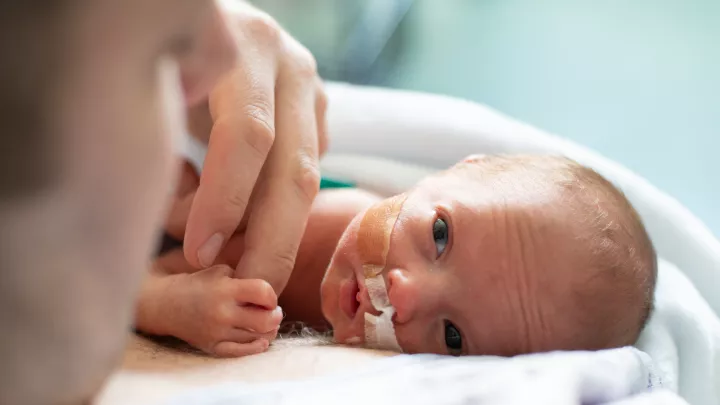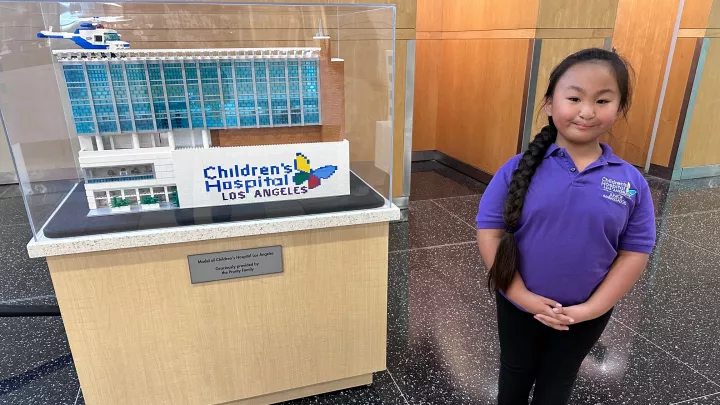Neonatal Surgery
Babies with critical illnesses or those who are born prematurely may need pediatric surgery within the first few days or weeks of life. Neonatal surgery involves treating serious conditions, like birth defects, blockages, or organ problems, that can affect a baby’s health and development. Because newborns are so tiny and delicate, neonatal surgery requires advanced techniques, specialized equipment, and the expertise of pediatric surgeons and a multidisciplinary team.
Our expert neonatal surgeons are skilled in performing even the most complex procedures, providing a level of care that sets us apart. Our team includes neonatologists from the Fetal and Neonatal Institute, pediatric surgeons, anesthesiologists, and specialists across multiple disciplines, including pulmonology, neurocritical care, and other medical and surgical fields. They work closely to ensure your baby gets the best care possible.
The Steven & Alexandra Cohen Foundation Newborn and Infant Critical Care Unit (NICCU) at Children’s Hospital Los Angeles is designated as a Level IV neonatal intensive care unit—the highest level of care available. This distinction reflects our expertise in managing the most complex and critical conditions in newborns. Our surgical team can perform procedures directly within the NICCU for babies too fragile to be moved to our operating rooms. This seamless integration of care ensures that even the most delicate neonatal surgeries are conducted safely, providing your baby with the best possible start to a healthy life.
Comprehensive Care Begins Before Birth
At CHLA, care for your baby starts long before birth. If a serious condition is detected during pregnancy, our expert team, including neonatologists, pediatric surgeons, intensive care physicians, and maternal-fetal specialists, collaborates with your obstetrician (OB) to develop a detailed care plan. We use advanced imaging and diagnostic techniques to understand your baby’s needs and determine the best course of treatment. This proactive approach ensures that your baby receives immediate, specialized care after birth, setting the foundation for a healthy future.
Neonatal Conditions We Treat
We provide surgical treatments for a wide range of infant and neonatal conditions and birth defects, including:
- Abdominal Wall Defects/Gastroschisis: A birth defect where a baby’s intestines develop outside the body through a small opening in the intestinal wall.
- Bladder Exstrophy: A rare condition where the bladder forms outside the body, causing problems with urination and bladder function.
- Bowel Atresia, Duodenal Atresia, and Intestinal Atresia: A blockage or narrowing in the intestine that prevents food from passing through.
- Cleft Lip and Palate: A gap in the upper lip and/or roof of the mouth that happens when facial structures do not fully develop during pregnancy.
- Cloaca and Cloacal Exstrophy: A severe birth defect where the abdominal organs, bladder, and parts of the intestines are exposed.
- Congenital Cystic Adenomatoid Malformation (CCAM) and Pulmonary Sequestration: Abnormal growths or tissue in the lungs that can affect breathing and lung function.
- Congenital Diaphragmatic Hernia: A condition where a hole in the diaphragm allows abdominal organs to move into the chest, affecting lung development.
- Congenital Heart Defects: Birth Defects that affect the structure of the heart and how it functions, ranging from mild to severe.
- Esophageal Atresia and Tracheoesophageal Fistula: Birth defects where the esophagus does not connect to the stomach or is abnormally connected to the windpipe.
- Failure To Thrive: When a baby cannot gain weight or grow properly, a gastrostomy tube (G-tube) may be placed to provide nutrition directly into the stomach.
- Hydrocephalus: A condition where excess fluid builds up in the brain, causing pressure and swelling.
- Imperforate Anus: A congenital condition where a baby is born without a normal anal opening, making it difficult or impossible to pass stool.
- Intestinal Malrotation: A condition where the intestines are not in the correct position, which can cause blockages or twisting.
- Micrognathia: A condition where the lower jaw is smaller than normal, potentially causing breathing or feeding difficulties.
- Necrotizing Enterocolitis (NEC)/Neonatal Perforation: A serious intestinal condition where tissue becomes inflamed or dies, sometimes leading to a hole in the intestines.
- Neonatal Hernias/Inguinal Hernias: A bulge in the groin or abdomen caused by a weakness in the abdominal wall.
- Posterior Urethral Valves: A condition in boys where extra tissue in the urethra blocks urine flow, causing bladder and kidney problems.
- Volvulus/Rotation of Bowel: A twisting of the intestines that cuts off blood supply, causing a medical emergency.
- Short Bowel Syndrome: A condition where a significant portion of the small intestine is missing or damaged, making it difficult to absorb nutrients.
- Spina Bifida: A birth defect where the spinal cord and surrounding structures do not form properly, sometimes exposing the spinal cord.
- Vascular Malformations: Abnormal clusters of blood vessels that can appear anywhere in the body.
- Hirschsprung’s Disease: A condition where nerve cells are missing in the colon, causing problems with passing stool.
Neonatal Surgery at Children’s Hospital Los Angeles
When it comes to neonatal or fetal surgery, choosing a specialized center is critical to ensuring the best outcomes for your child. What sets Children’s Hospital Los Angeles apart is our holistic approach to neonatal surgery. Beyond a team of specialists that includes surgeons, neonatologists, dietitians, intestinal rehab experts and pediatric pharmacists, we offer essential services, such as child life specialists, sibling support, and parental accommodations. Our neonatal care units include private and semi-private rooms designed with families in mind, allowing parents to stay close to their baby during recovery. Additionally, our Neonatal Surgical Nutrition Team collaborates to optimize growth and recovery for babies following surgery, showcasing our commitment to every child’s health and well-being.
At CHLA, we don’t just focus on immediate surgical needs—we offer continued care that supports your child’s health throughout their young life and, in some cases, into adulthood. Our comprehensive approach, combined with access to therapies, advanced treatments, and a compassionate support system, makes CHLA the top destination for neonatal procedures.
Neonatal Surgical Nutrition Support
Our Neonatal Surgical Nutrition Team collaborates to optimize growth and recovery for babies following surgery, showcasing our commitment to every child’s health and well-being. In addition to providing specialized nutritional support, the team helps facilitate breast milk provision and breastfeeding initiation. They are also dedicated to improving breast milk availability at discharge by supporting early skin-to-skin care, even for surgical patients, offering pumping support and prioritizing the first oral feed at the breast. Their efforts have led to significant progress in ensuring the best possible nutritional start for babies.
ECMO for Babies
At CHLA, neonatal surgical care is complemented by advanced life-support options like Extracorporeal Membrane Oxygenation (ECMO). ECMO serves as a heart-lung machine, performing essential functions for babies with severe heart or lung conditions, allowing their organs to rest and heal. We have earned the Center of Excellence — Gold Level recognition from the Extracorporeal Life Support Organization (ELSO), highlighting our commitment to exceptional care.
We utilize ECMO for various conditions, including congenital diaphragmatic hernia (CDH), where a hole in the diaphragm allows abdominal organs to move into the chest, affecting lung development. In such cases, ECMO supports the baby's heart and lungs, stabilizing them for necessary surgical interventions. Our specialized team, available 24/7, ensures that each infant receives comprehensive, multidisciplinary care, integrating ECMO seamlessly into their treatment plan.


